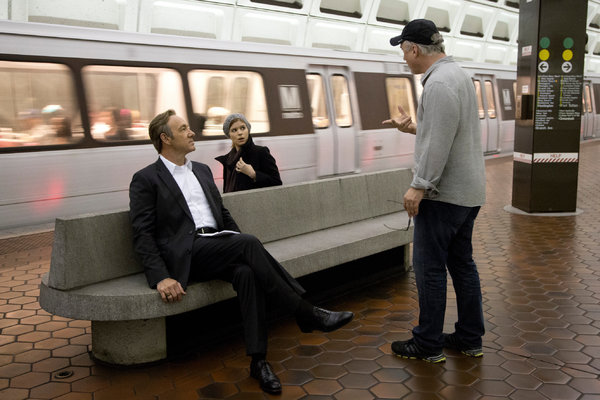 I became a Netflix subscriber more than a year ago, when I wanted to check out their first original series. “Lillihammer” starred Steven Van Zandt in pretty much the same role he played in “The Sopranos,” an eccentric mobster. Except this time he was transferred to Norway like a fish out of water.
I became a Netflix subscriber more than a year ago, when I wanted to check out their first original series. “Lillihammer” starred Steven Van Zandt in pretty much the same role he played in “The Sopranos,” an eccentric mobster. Except this time he was transferred to Norway like a fish out of water.
Strange thing about that series is that it was put together to serve both U.S. audiences and those in Norway. It didn’t really work. And I didn’t see any more of it past episode one.
“House of Cards,” meanwhile is a huge jump forward, with a plotline full of intrigue, dialogue that largely crackles and a great ensemble cast. I marched right through its 13 episodes in a week or so, just as I do any other series that I happen to get a whole season at a time (which doesn’t happen that often).
With “House of Cards” everybody can have that opportunity to jump in and see two or three in a row, or hunker down and watch all day. It’s the kind of viewing that feeds into that desire to blast ahead. TV producers used to design TV dramas, especially serialized ones, to give you the urge to tune in next week at the end of each show. Now you just have to wait a few seconds until the next one loads.
Episodes become more like chapters in a book, binge viewing ensues. And as in some books of which you are particularly fond, you find yourself slowing down as you reach the end, just as a way to sustain the experience.
Everyone’s ability to watch “House of Cards” as once makes it tough for TV writers to cover. No longer can we consider an episode at a time, look at its many facets and imagine what it will mean in coming episodes — we know it all already, or many do. Nor do we know when to step in and tease an “upcoming” episode or risk spoiling what some haven’t seen.
It turns TV reviewing into more book reviewing, in that you could write a piece that sets the whole thing up, but hold back on the details and conclusions that the reader will find on his own.
So let’s just say that if you haven’t seen it, “House of Cards” is an alluring, slickly and smartly made political yarn that comes with strong pedigree — a solid British series to base it on. The Netflix version has successfully adapted it to the halls of D.C., and in its focus on power grabbing and policy, it has more realism than the suddenly half dozen series that have to do with the city, from “NCIS” to “Veep,” “Political Animals,” “16oo Penn,” “Scandal” and “The Americans.”
For one thing, more of it is shot in the city than the others. That sleek montage of D.C. scenes that open each episode is a thing of beauty. And while some of it is shot out of town in Baltimore (the BBQ place, Zoe’s apartment), the fact that there’s even a shot inside an actual Metro station brings a nice layer of realism to the proceedings.
Kevin Spacey is just right as the ambitious and crafty Congressman Frank Underwood, with a lilting Carolina accent and the right amount of menace and charms that make others do his bidding. As action begins, Underwood is reeling on inagauration day of a new administration, upset that he didn’t get the job of Secretary of State as he promised.
This comes a Plan B so complicated, it’s never fully explained at the outset but unfolds before the viewers. It involves not only Underwood’s ambitions, but that of his wife, played by Robin Wright, who has her own non-profit to think of. How things move ahead involve getting a reporter in a vest pocket, a Congressmen as well and managing a big funding energy corporation that wants to control every move.
The journalism depiction is off-putting, as is the depiction of women. Kate Mara plays another young reporter who feeds her ambition by sleeping with Underwood. What’s more off putting, her method of gaining access or how she’ll plant whatever it is the congressman wants her to post without questioning his motive. That this is presented as a natural way for news to be generated is insulting and misleading.
Because it is well written and acted, we are drawn to the other storylines as well — the terrible congressman who, once caught, must now be a pawn in the bigger scheming; the loyal chief of staff who deals with the dirtier work and tries to stave off controversy; the humorous depiction of a bumbling vice president. There’s also room in the series for some interesting side stories and aspects of personality that add richness to the story.
Best of all, there’s still room, as the action begins to close its knots at the end, for much more to occur in another season — which is not really a season at all. It’s another glut of episodes on which we can feed.